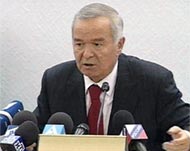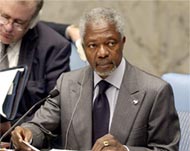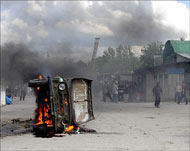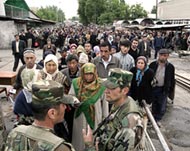Annan: Uzbekistan rejects inquiry
Uzbek authorities have shrugged off calls for an international investigation into last week’s government crackdown on protesters that witnesses say killed hundreds.

UN Secretary-General Kofi Annan said Uzbek President Islam Karimov opposed an international investigation into the worst bloodshed since the country’s independence in 1991.
“He said he had the situation under control and was taking every measure to bring those responsible to account and didn’t need an international team to establish the facts,” the UN chief said in New York on Thursday night.
Karimov has blamed Islamic militants for the unrest and denies that his troops fired on unarmed civilians, dismissing claims of rights activists who put the death toll at over 700.
UN concern
Karimov’s office, however, denied that a proposal for an independent investigation was raised in talks with Annan, the Uzbek presidential press service said in a statement.
On Friday, a UN human rights expert said he asked Uzbekistan to allow him to visit the country to assess the situation there but received no immediate reply.
 |
|
President Karimov insists an |
Philip Alston, UN special investigator on illegal and arbitrary executions, said in a statement that he was “gravely concerned about reports that hundreds of people, including women and children, were killed on 13 May when government troops fired indiscriminately to disperse a demonstration in Andijan”.
The United States and other Western nations have intensified pressure on Karimov to allow an international investigation, but the West’s ability to persuade him is limited: The Uzbek leader has resisted calls to end the crackdown on the opposition and allow more democracy since taking the helm before the 1991 Soviet collapse.
US ally
In a sign of concern about the situation in Uzbekistan, a key US ally in the war on terrorism, General John Abizaid, head of US Central Command, said the US military has scaled back its operations from the Central Asian state since violence broke out late last week.
 |
|
Annan said Tashkent had |
US forces operate out of an air base in the country to support operations in Afghanistan. The base in Khanabad is in southern Uzbekistan, several hundred kilometres from the unrest in the east.
“We have decided to make sure that we’re cautious about how we’re operating,” he said, according to a Pentagon transcript of his comments on Wednesday to a small group of reporters. He said the change was not meant to be a message to Uzbekistan’s government.
Asked about who was driving the violence, he said: “I think this is a level of violence that’s coming probably from a lot of different groups that aren’t altogether clear to me, but I would not necessarily characterise them in one way or the other.”
Token reduction
An Uzbek government official who asked not be named for fear of losing his job said he thinks the US statement was intended to pacify those who, like British Foreign Secretary Jack Straw, condemned the Uzbek government action and were pushing for an international investigation.
 |
|
Opposition groups say about |
The official said he thinks the US military would make only a token reduction in base activities, if any.
During the violence last week, government troops opened fire on demonstrators in Andijan after protesters stormed a prison, freed inmates and seized local government offices, taking officials hostage.
The government says 169 people died in Andijan, but opposition figures and rights activists say more than 700 were killed – more than 500 in Andijan and about 200 in nearby Pakhtabad – most of them civilians.
Government regains control
The riots in Andijan triggered an uprising in a nearby town of Korasuv on the border with Kyrgyzstan, where followers of Bakhtiyor Rakhimov, a farmer turned rebel leader, burned government buildings and drove away authorities on Saturday.
The government reclaimed control before sunrise on Thursday, quickly arresting Rakhimov, who had vowed to build an Islamic state.
 |
|
Tashkent accuses Kyrgyzstan |
About 20 of Rakhimov’s associates were arrested, his sister Yulduz said.
On Friday, about 500 Korasuv residents gathered in front of the administration building to protest the death of one of those who was detained, Dilmurad Mamadjonov.
Scores of police stood guard at the building, but didn’t move to quell the protest, according to Alexei Volosevich, a local journalist who visited the scene.
Kyrgyzstan tensions
The Uzbek Foreign Ministry condemned neighbouring Kyrgyzstan for letting more than 500 Uzbeks fleeing the violence cross the border, and said weak controls had led to “serious riots” and actions staged by religious groups.
“The local Kyrgyz authorities didn’t control the situation,” the ministry said in a note handed to the Kyrgyz ambassador. “The situation may spin out of control if they continue to fail to take necessary steps.”
In Andijan, dozens of Muslims headed to Devonaboi Jome mosque in the old town for Friday prayers.
“We will pray for peace so that there will be no more bloodshed,” said Mirzorakhim Khodji, the mosque’s deputy imam. Uzbekistan’s mosques are tightly controlled by the government, which watches closely for any sign of dissent.
Addressing over 1000 believers who gathered inside and near the mosque, Imam Muhammad Sadyk said the violence in Andijan was the work of “bands of bandits”.
“Please don’t follow these people,” he said. “If you see crowds of people, stay away. Even if you’re interested, don’t do it.”
Poverty and repression
But some believers who attended the Friday prayers in the Shaikh Zainitdin mosque in capital, Tashkent, said the unrest was triggered by poverty and repression.
“People rose up because of the lack of democracy here,” said Razik, 50, who only gave his first name, fearing reprisals.
The 13 May protest was triggered by a trial of 23 local Islamic businessmen. Many of the demonstrators were citizens complaining about poverty and unemployment.